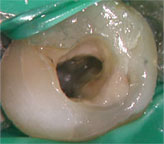Root Canal treatment also know as Endodontic treatment is a discipline that we excel in at Southgate Dental Care.
Dr Carlo Risoli together with our in house specialists ensure that if you have to have a root canal treatment done then you can be assured that you will receive the highest standard of care.

Dr Philip Mitchell
Specialist in Endodontics
GDC 64453Philip qualified as a dentist from University College Hospital in 1989, and subsequently completed a Master's degree in Endodontics at Guy's Hospital in 1996. Philip has been accepting endodontic referrals at the Southgate Referral Practice since 1997.
Philip has been on the specialist list for endodontics since 1999. He is a consultant and honorary senior lecturer at KCL/Guy's hospital. He is deputy programme director for the MClinDent Endodontics and deputy chairman of the examinations board. He is an examiner for RCS Edinburgh. He has lectured widely and contributed to several textbooks.

Dr Chrsitina Kotsiopoulou
Practice Limited to Endodontics
GDC 263423Christina graduated with top grades from the Dental School of the University of Athens, Greece, in 2014. After she qualified, she gained professional experience working as a volunteer dentist in the Greek military dental department and as an associate dentist in a general and in a top-end Endodontic private practice in Athens for 2 years, where she had the opportunity to enhance her endodontic skills.
In 2016 she decided to leave Greece and move to the UK, driven by her passion to broaden her dental horizons. She has been since then, successfully practising all aspects of general dentistry and in particular root canal treatments under an operating microscope or high magnification loupes. Christina has worked in multiple NHS and private practices in Bedfordshire, Hertfordshire and London.
Her dedication and professional experience inspired her to pursue further knowledge in root canal treatments, therefore, in 2019 she embarked in the 3 years MSc Endodontic program, at the prestigious Queen Mary University of London and she successfully qualified with flying colours. Her two dissertation topics were related to ways of management of removal of separated instruments, as well as to the comparison of dental anxiety between UK and Greek patients.
With a broad background in restorative dentistry and driven by passion for providing exceptional quality dental treatment to the highest standards, Christina is fully committed to keeping up to date with the latest innovations and gadgetry in the field of modern Endodontics. She is a firm advocate of a lifelong approach to learning and education. Each year, she takes many advanced courses to enhance her skills and stay at the top of the Endodontics field. Christina believes in the importance of giving patients a comfortable experience as well as providing them with exceptional dental care..
She is a fluent speaker of Greek (mother tongue), English, Spanish and French and has basic knowledge of Chinese Mandarin.
In her spare time, Christina enjoys exploring the UK and new countries, and she also loves a good pilates work-out after a long and tiring day!
Root Canal Treatment
 The purpose of root canal treatment is to remove the inflamed tissue or bacteria inside the root canal and thus allow the surrounding tissues to heal
The purpose of root canal treatment is to remove the inflamed tissue or bacteria inside the root canal and thus allow the surrounding tissues to heal
Root canal treatment is carried out when the pulp (soft tissue inside a tooth) is either inflamed or dead. The pulp is a tissue made up of nerves, connective tissue and blood vessels.
The pulp may become inflamed or may die if either there is significant decay in a tooth, if there is a large restoration (filling or crown) or if the tooth has been subjected to trauma.
The inflamed pulp may cause toothache or remain pain-free. When the pulp dies, the space it inhabits (the root canal) rapidly becomes infected with bacteria. This may cause pain and swelling in the supporting tissues (abscess) or the tooth may remain symptom-free.
How Root Canal Treatment Can Help
The purpose of root canal treatment is to remove the inflamed tissue or bacteria inside the root canal and thus allow the surrounding tissues to heal.
After cleaning the root canal system, the space created is filled with a root filling to prevent reinfection. A material called gutta percha is used as the root filling material. This a natural substance very similar to rubber.
A Complex System
 The purpose of root canal treatment is to remove the inflamed tissue or bacteria inside the root canal and thus allow the surrounding tissues to heal
The purpose of root canal treatment is to remove the inflamed tissue or bacteria inside the root canal and thus allow the surrounding tissues to heal
The root canal system, especially in molars, is often complex and difficult to clean well. This is why many general dentists prefer to refer these cases to a specialist who has the training, equipment and experience to deal with them well. A specialist will use a surgical microscope during treatment, to magnify the tooth to approximately x20, to enhance success rates.
The treatment is time consuming because of its complexity but can readily be done using modern local anaesthetic techniques with little or no discomfort. It is normal for patients to experience some soreness after treatment as the supporting tissues of the tooth may be a little bruised.
Currently, we can expect success rates of over 90% for first time root canal treatments performed by a specialist endodontist. The success rate is reduced to about 80% when an existing root treatment needs redoing if it has failed. As yet, there are no long term scientific data to tell us how long a root treatment will last although long term failure does not appear to be a problem clinically.
Frequently Asked Questions
- Why does root canal treatment take so long?
- How many visits will be needed?
- Who will do the tooth crown or filling on top of the tooth?
- How soon after root canal treatment should I have a new crown placed?
- What are likely success rates?
- What does success mean?
- My tooth has been root canal treated and it still hurts. Why?
- Why can't my regular dentist do the root canal treatment?
- How long will the root canal treatment last?
Why does root canal treatment take so long?
Root canal treatment on a molar tooth will normally take from ninety minutes to three hours. Some complicated cases may take longer. Root canals are often complex structures and may be very fine. It is not uncommon to find four or five canals in a molar tooth, the finest of these often being less than .05 mm in diameter.
All of the canals and interconnecting fins need to be cleaned of pulp tissue and bacteria. This is done with various medicaments and modern superelastic files.
The medicaments need time to be effective at dissolving all of the pulp tissue and killing all of the bacteria.
Sometimes an anti-bacterial dressing will need to be placed in the tooth for a period of one week to kill resistant microbes. A temporary filling will be placed in the tooth during this period.
How many visits will be needed?
Most simple cases that have not been root canal treated before can be completed in one visit. More complex treatments and particularly retreatments may require two or three visits.
A more accurate assessment can be given if your dentist sends a preoperative x-ray.
Who will do the crown or filling on top of the tooth?
Your regular dentist will do this after completion of root canal treatment. As a specialist, my practice is limited to endodontics and I am not equipped to perform routine dentistry.
The permanent crown or filling is as important to the prognosis of the tooth as the root filling.
How soon after root canal treatment should I have a new crown placed?
In the majority of cases, the tooth should be permanently restored with a crown or filling as soon as possible. Delaying this can allow the inside of the tooth to become recontaminated.
The permanent crown or filling is as important to the prognosis of the tooth as the root filling.
In some cases with a questionable prognosis, the provision of a crown may need to be delayed.
What are likely success rates?
Well controlled clinical studies that have been published in dental journals, report success rates of around 90% for first time root treatments done by specialists or within a hospital environment.
These success rates are reduced to about 80% if the tooth has already been root canal treated.
The only studies to give an indication of general success rates are epidemiological (epidemiology; the study of disease within a community) studies. Reported success rates are generally much lower at 50-60%.
What does success mean?
The tooth must be;
- free of all symptoms and signs of disease (no evidence of disease either clinically or on an x-ray) and remain functional.
This means that technically, if healthy bone does not reform around the root of a tooth after root canal treatment, the root treatment is considered a failure, even if the tooth is symptom-free and functional.
It would be normal to keep such a tooth under observation as many of these cases remain stable.
My tooth has been root canal treated and it still hurts. Why?
It is normal for teeth to be sore for a days after root canal treatment. Some teeth, particularly ones that have been problematic for a while, may take a few months to settle.
This discomfort is normally from the inflamed supporting tissues.
Hot or cold sensitivity should not be present and is an indication that there is still some pulp tissue remaining. Sometimes this sensitivity may be emanating from another tooth.
About 3% of infected cases will 'flare up' after treatment. Inevitably, in all infected teeth, bacteria are pushed through the end of the root during root canal treatment. These bacteria will be very small in number, but if they are virulent enough, they may spark the inflammation around the root into action. Typical signs and symptoms will be pain and swelling. This problem is transient and is normally helped with a course of antibiotics. It has no bearing on the long term prognosis.
Why can't my regular dentist do the root canal treatment?
Root canal treatment can be a technically demanding procedure. Some general dentists prefer to refer complex molars or retreatment cases to specialists. Research suggests that specialists have high success rates.
A specialist has the training, equipment and expertise to tackle these cases more predictably.
Some of the equipment, particularly the surgical microscope takes a long time to learn to use effectively.
How long will the root canal treatment last?
Although we have a good idea of short term success rates for root canal treatment, we do not know what the long term failure rate is. This is because it is very difficult to follow up a sample group of patients for periods of 20-30 years. Any research of this type would be useless unless at least 50% of the patients could be reviewed at the end of the study. In today's increasingly mobile society, this is a challenge.
Anecdotally, it would appear that long term failure of technically good root canal treatments does not seem to occur in well maintained mouths. These teeth are more likely to be lost because they fracture or of gum disease,
« Back to Dentures Dentistry



